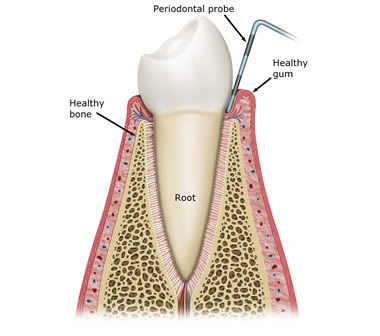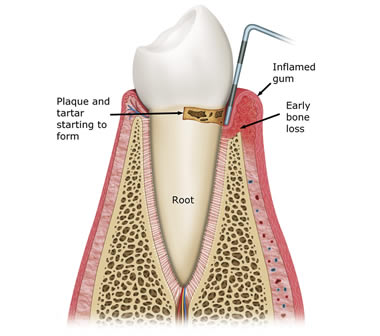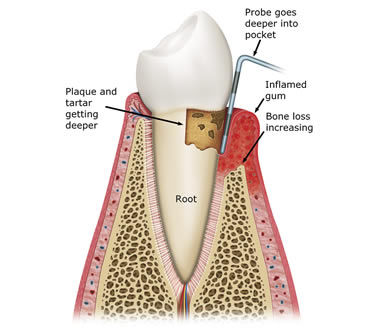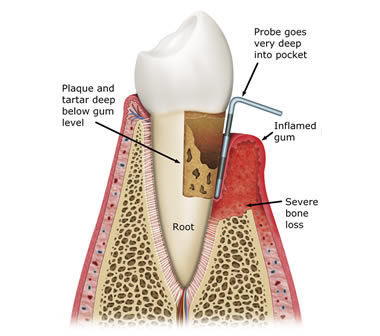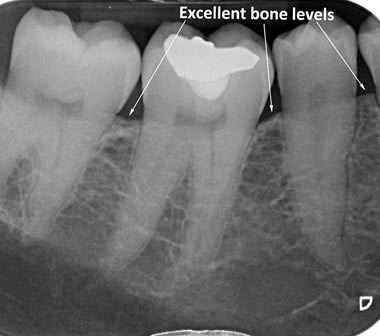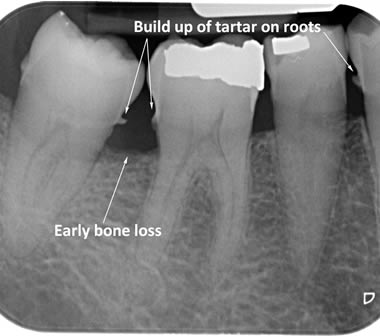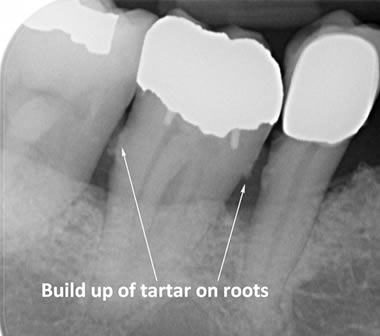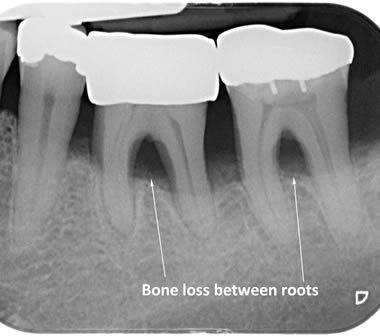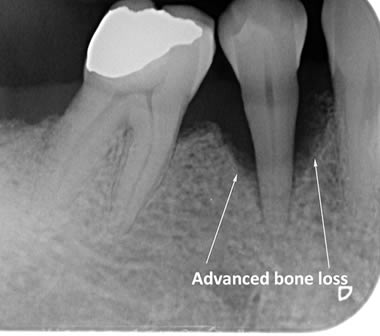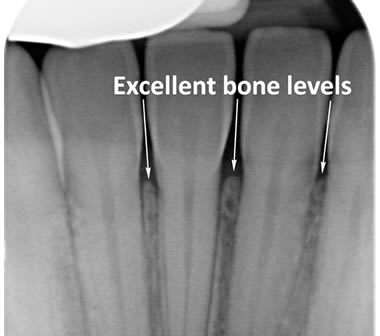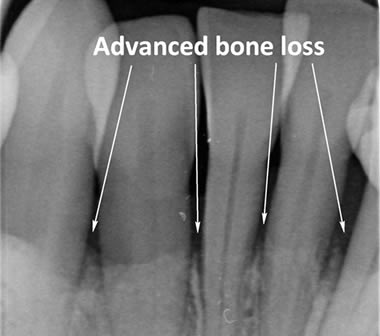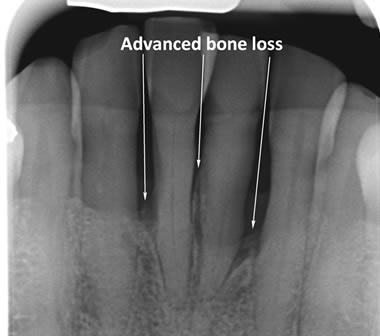Gum Disease

Although most people do not realise it there are several different forms of gum disease (periodontal disease). The commonest two are gingivitis and periodontitis.
Gingivitis is basically inflammation of the gums and is the early stage of gum disease. In gingivitis the gums become red, swollen and bleed easily. Fortunately gingivitis is completely reversible and good oral hygiene combined with thorough professional tooth cleaning can eliminate the problem.
Periodontitis is a more advanced stage of gum disease where there has been damage to the bone which supports the teeth. If left untreated periodontitis leads to more and more bone loss until the teeth start to become loose and eventually fall out by themselves or need to be extracted by a Dentist.
The Cause Of Gum Disease
The main cause of gum disease is plaque. Plaque consists of millions of bacteria which live on and around the teeth and gums. These bacteria produce toxins which damage the gums. To begin with the gums start to peel away from the teeth and “pockets” form. As the bacteria penetrate deeper into these “pockets” they then start to cause damage to the bone which holds the teeth in. As more bone loss occurs the teeth start to become increasingly looser until they eventually start to fall out one by one.
Unfortunately some people have a genetic susceptibility to gum disease and will suffer serious gum disease with only small amounts of plaque. This genetic “weakness” cannot be altered but treatment can still help many of these people keep their teeth for a long time.
Smoking has been shown to have a harmful effect on many parts of the body and this also applies to the gums. Smoking alone will not cause gum disease but patients suffering from gum disease will often experience more bone loss, more gum problems and more tooth loss if they smoke.
If you smoke and have gum disease it would certainly be beneficial to your gums if you were able to give up smoking.
What Are The Signs Of Gum Disease
Gum disease can be difficult to spot without a thorough gum examination by a Dentist. However, the following signs are often associated with gum disease:-
- Gums which bleed when brushing, eating or even spontaneously
- Red, swollen or tender gums
- Loose teeth
- Gaps opening up between the teeth
- Bad breath
- Receding gums
- Pus oozing from the gum margins
- Frequent dental abscesses
The diagrams below show the different stages of gum disease
Please hover over the slider and use the arrows to move the sliders left and right, swipe to slide, and select the thumbnail to enlarge. (12 images)
How To Treat Gum Disease
The first step on the road to healthier gums is improved oral hygiene. For any patient suffering from gum disease it is absolutely vital that they are able to carry out an excellent standard of oral hygiene and keep their teeth as clean as possible.
Unfortunately most people do not clean their teeth very well as they have never been shown how to do it properly. In our Clinic we have two Dental Hygienists who are excellent at showing patients how to carry out efficient tooth cleaning through a combination of toothbrushing, flossing and the use of small bottle brushes for cleaning the in-between teeth areas. The Hygienist will work with a patient for as long as it takes for them to pick-up and learn the required tooth cleaning skills.
In addition to helping patients improve their oral hygiene our Hygienist’s will also carry out thorough scaling and polishing to remove any build-up of calculus (tartar) which has formed on the teeth above the gum level.
Calculus (tartar) is the hard deposit which forms on the teeth in areas where plaque is left undisturbed. Calculus is too hard to brush off with a toothbrush and needs to be removed by the Dental Hygienist with special scaling instruments.
In cases of advanced gum disease our Hygienist’s will also carry out deep scaling which cleans the root surfaces beneath the gum level. When pockets develop in the gums around the teeth plaque bacteria and calculus form on the root surfaces of the teeth and are protected from toothbrushing by the overlying gum. However, our Hygienist’s have special thin scaling instruments which can go down inside the pockets to clean the root surfaces. This treatment is carried out in small sections under local anaesthetic to ensure that you are comfortable throughout the treatment.
In rare cases gum surgery may be advised but this is not common today.
Smoking has been shown to be detrimental to gum health. Therefore, if you are a smoker, giving up will benefit the health of your gums and increase your chances of overcoming gum disease.
Gum Disease And Links To Other Diseases
Unfortunately gum disease has been linked to several other diseases such as heart disease, strokes, diabetes and premature and low-birth-weight babies.
The risk of heart disease may be increased in people with gum disease. This is thought to occur partly because the bacteria found in gum disease can get into the bloodstream and can then travel around the body and affect the heart.
Similarly people with gum disease have been found to be at increased risk of suffering a stroke.
People with diabetes are more likely to develop gum disease than those without. In addition to this there is also some evidence to suggest that people with gum disease may be more likely to develop diabetes.
Women who are pregnant are much more likely to give birth prematurely and have a low-birth-weight baby if they are suffering from gum disease.
Therefore it is very clear that having healthy gums is important for good general health, not just oral health.
What To Do If You Think You May Have Gum Disease
The first thing to do is see your own Dentist and ask them whether you have gum disease. A simple gum examination should be sufficient for your Dentist to reassure you that you are okay or to discover that you do have signs of gum disease.
If you have early gum disease your Dentist (or Dental Hygienist, if your Dentist has one) may be able to treat the problem quickly and simply with advice on oral hygiene measures and thorough scaling and polishing.
If you show signs of more advanced gum disease then your Dentist may suggest referral to a Periodontist, (a Dentist who specialises in the treatment of gum disease) such as Dr Roberts, for more advanced treatments.
If you are concerned about the condition of your gums or would like a second opinion you could also refer yourself directly to Dr Roberts.
To refer yourself directly to Dr Roberts click here.

 0113 268 2500
0113 268 2500